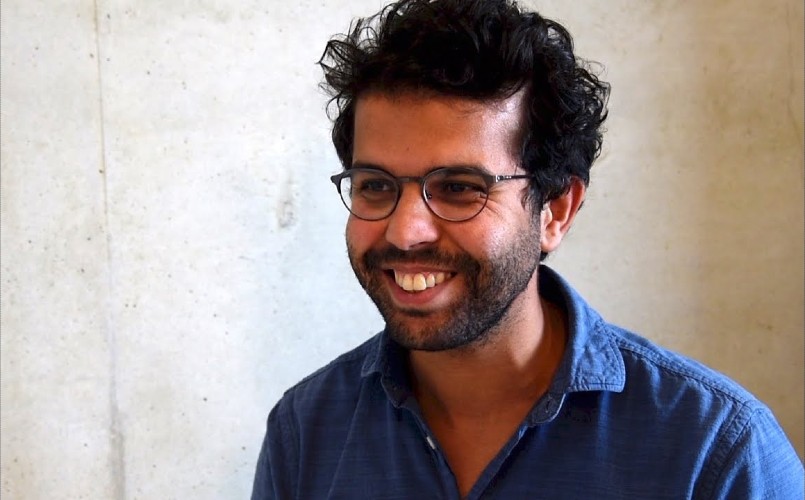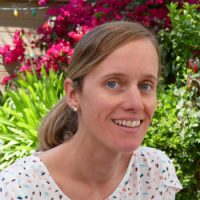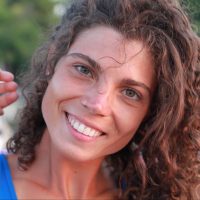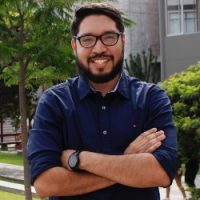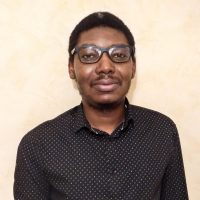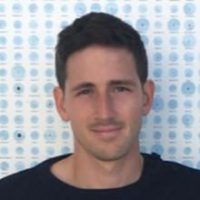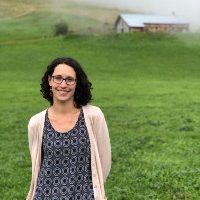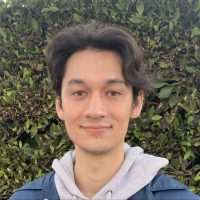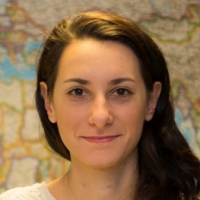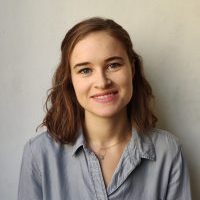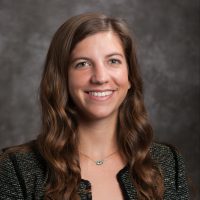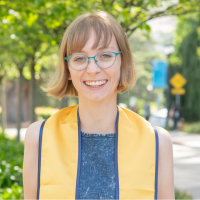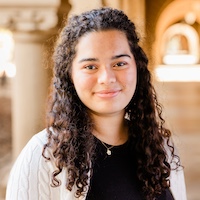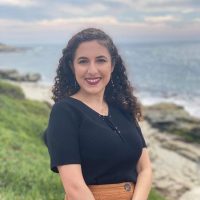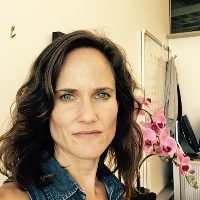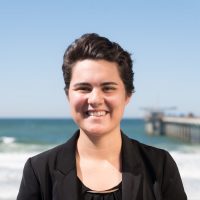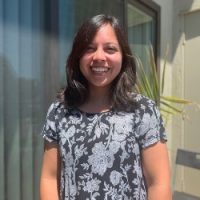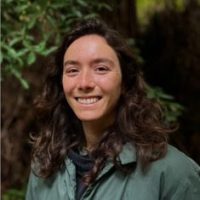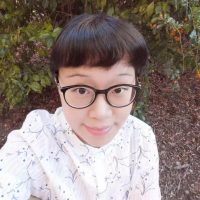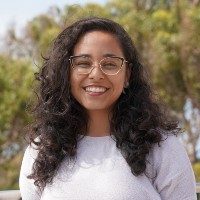Tarik Benmarhnia is an environmental epidemiologist at the University of California San Diego’s Scripps Institution of Oceanography. He finished his PhD in epidemiology jointly from the University of Montreal and Paris Sud and a post-doctoral position at McGill University with the Institute for Health and Social Policy. His work is combining epidemiological methods with environmental and econometric models with a specific focus on health policies and environmental justice.
Postdoctoral and Visiting Scholars
Undergraduate Researchers
Rosana is a postdoctoral researcher at SIO-UCSD working at the intersection between environmental science, climate and public health. She is also part of the research group directed by Dr. Alexander Gershunov, which focuses on climate and weather extremes. Rosana’s research path started as a watershed hydrologist and limnologist studying spatio-temporal patterns in riverine water quality under global change. During her previous postdoctoral experience at UC Santa Barbara, Rosana was involved in assessing the impacts of nutrient availability and pollution on coastal ecosystems in California. At her current position at SIO, Rosana has focused on the link between coastal water quality and extreme precipitation events caused by atmospheric rivers, which has implications for public health. Her most recent work is related to quantifying smoke exposure from Santa Ana wind-driven wildfires and associated impacts on respiratory health in Southern California.
Chen Chen is a postdoctoral scholar at Climate, Atmospheric Science & Physical Oceanography. Her research explored different aspects of health impact from air pollution, including air pollutants from biomass combustion in developing country, temporal trend of association between fine particulate matter and human health, air pollution related health impact under climate change, and population disparities in air pollution related health burdens. She completed a Ph.D. degree in Environmental Health Sciences from Yale University School of the Environment and a M.S.P.H. degree in Occupational Health and Environmental Hygiene from Johns Hopkins Bloomberg School of Public Health.
Michael is a postdoctoral scholar at SIO-UCSD. He earned his PhD in Biostatistics from UCSD in 2025, defending his dissertation on longitudinal randomized clinical trial design and treatment effect heterogeneity. Prior to studying at UCSD, he worked as an embedded software engineer in the aerospace industry. His research focuses on methodology for effect measure modification in high-dimensional settings and transportability analyses, with applications to climate-related exposure effects on health outcomes.
Arnab is a public health researcher with a PhD from University of California San Diego in Global Health. His research focuses on understanding how environmental and climate stressors affect health outcomes, with an emphasis on maternal and child health. His public health expertise ranges from implementing interventions aimed at improving access and utilization of healthcare services to evaluating the efficacy of large-scale technical support programs to local governments. Through interdisciplinary approaches, he works to advance health equity and outcomes, particularly among vulnerable populations.
Anna is a postdoctoral scholar at the Scripps Institution of Oceanography (SIO) at the University of California, San Diego. She holds a PhD in Economics and Social Sciences from the Vienna University of Economics and Business (WU), where she also earned an MSc in Socio-Ecological Economics and Policy. Additionally, she holds an MA in Economics from the University of Glasgow. Anna’s research focuses on the impacts of environmental change on human health and well-being, with a particular focus on populations in low- and middle-income countries. Anna studies a wide range of issues related to public health, including child nutrition, infectious diseases, and reproductive health, as well as topics related to migration. A core aim of her research is to deepen our understanding of the social determinants of vulnerability to the impacts of climate change and to identify factors that enhance adaptive capacity. Before joining the Climate Change Epidemiology Lab at SIO, Anna contributed to research projects at the International Institute for Applied Systems Analysis, the Wittgenstein Centre for Demography and Global Human Capital, and the Austrian Academy of Sciences.
Dr. Garber is a postdoctoral fellow with Dr. David Rojas-Rueda at Colorado State University and Dr. Benmarhnia at UCSD. Michael graduated with his PhD from the Department of Epidemiology at Emory University Rollins School of Public Health in December of 2020. At Emory, Michael used smartphone-generated data to study the effect of bicycle infrastructure on bicycling and bicyclist crashes in Atlanta. His specific focus was considering potential biases and study-design-related issues that could arise from the use of these data sources in epidemiology. He was awarded an F31 predoctoral fellowship from National Institutes of Helath to fund his dissertation research and has co-authored 13 peer-reviewed publications. Before beginning the postdoctoral fellowship, Michael was a Geospatial Epidemiologist with the Geospatial Research, Analysis, and Services Program (GRASP) at the Centers for Disease Control and Prevention.
Changwoo Han is an associate professor at Chungnam National University College of Medicine located in Daejeon, South Korea. He graduated from Chosun University Medical School and was trained as a preventive medicine specialist and completed his master’s and Ph.D. degrees at Seoul National University College of Medicine. He is interested in evaluating the health impacts of natural and social disasters using secondary data and applying quasi-experimental methods.
Caitlin Jones-Ngo is a postdoctoral scholar in Climate, Atmospheric Science, and Physical Oceanography at the University of California San Diego (UCSD) Scripps Institution of Oceanography (SIO). Her research focuses on relationships of environmental health hazards, ecological integrity, and public health. Caitlin obtained her PhD in Public Health Sciences from the University of California Davis working with Dr. Kathryn Conlon on threats of compound climate hazards. Prior to her doctoral work, she completed her MS in Conservation Medicine at Tufts University Cummings School of Veterinary Medicine, a program focused on One Health studies, followed by work in local and state public health agencies, including the Cal-EIS fellowship with the California Department of Public Health.
Noemie Letellier is a postdoctoral researcher at SIO/FMPH where she will study the effect of environment (e.g. air pollution, climate change, built environment) on health focusing on social, ethnic and spatial inequalities, using spatio-temporal analysis and causal inference methods. Noemie obtained her PhD in Epidemiology from Montpellier University, France. Her dissertation focused on the influence of living and working environment on cognitive performance level and risk of dementia and how it can lead to socioeconomic inequalities in cognitive aging. She obtained her Master’s degree in Epidemiology from the Institute of Public Health, Epidemiology and Development (ISPED) at Bordeaux University. She completed a Bachelor’s degree in Geography from Lyon University.
Yiqun Ma is a postdoctoral scholar at the Scripps Institution of Oceanography, University of California San Diego. Her research focuses on climate epidemiology, investigating the health effects of extreme air temperatures, air pollution, and wildfires, with a particular interest in environmental justice. Before joining UCSD, Yiqun earned her Ph.D. in Environmental Health Sciences from Yale University and a Bachelor’s degree in Management Sciences from Zhejiang University in China.
Jennifer is a first year PhD student in the UCSD/SDSU Public Health Program in the Global Health Track. She completed her undergraduate degree in Environmental Studies at the University of San Diego in 2014, after which she worked for the San Diego Airport on a variety of issues such as integrated pest management and sustainability reporting. It was through this experience that Jennifer realized she wanted to be involved in environmental science policy, and so she completed a Master of Advanced Studies in Climate Science and Policy from Scripps Institution of Oceanography in 2017, where she worked with Dr. Tarik Benmarhnia looking at climate change co-benefits related to the health impact of interventions reducing air pollution from wood burning in Athens, Greece. After graduation, she continued to work with Dr. Benmarhnia, contributing to communications on climate and extreme weather impacts to human health in Southern California, such as heat waves and wildfires. In 2018, Jennifer worked for the United Nations Environment Programme’s Regional Office for North America as a Chapter Coordinator for the 6th Global Environment Outlook, focusing on strengthening integrated assessments and the science-policy interface in North America. Continuing along this vein, she then spent 2.5 years working for the National Observatory of Athens in Greece within their Institute for Environmental Research & Sustainable Development focusing on European Commission funded projects and science-policy work related to urban air quality, sustainable development, and climate change impacts on cultural heritage.
Hale Brown (they/she) is a graduate researcher in the Climate Change Epidemiology Lab and a Master’s student in Climate Science and Policy at SIO. Their research examines the health impacts of nighttime heatwaves on morbidity and mortality, translating this evidence into policy by engaging key stakeholders to develop comprehensive recommendations. Hale’s work bridges data analysis with actionable strategies to address climate-driven health inequities. Previously, they led global initiatives at the intersection of mental health, climate resilience, and policy advocacy, including international dialogues and research efforts integrating psychological resilience into climate adaptation for vulnerable communities.
Anusha is a Master's student in Earth Sciences at SIO, working jointly with isotopic geochemist Dr. Sarah Aarons and Dr. Tarik Benmarhnia. She is interested in investigating the relationships between how the socioeconomic and political climates drive changes to natural earth systems and planetary health. In the past she has applied her geochemistry background towards understanding paleoclimatic atmospheric transport pathways, as well as modeling nitrous oxide pollution in California. Her current research combines epidemiological and geochemical techniques to investigate if PM toxicity caused by biomass burning during California wildfires is influenced by bedrock and soil composition.
Sharan is a current Master of Advanced Studies in Climate Science and Policy student at Scripps Institution of Oceanography. Prior to this, she obtained her Bachelor of Science degree in Environmental Science, Policy, and Management from UC Berkeley, where she was a Regents' and Chancellor's scholar. Her previous research encompassed ecological sciences and natural resource management, specifically in global environmental policy and sustainability. In addition to this, she has extensively researched plastics pollution in South Asian communities in relation to elevated rates of microplastic pollution found in bloodstreams. Currently, she is working with Dr. Benmarhnia researching linkages between human health communities and environmental toxins, exacerbated by atmospheric warming and chemical reactions.
Anaïs is a PhD student in the UCSD-SDSU JDP program studying Epidemiology. Her undergraduate degree was completed in 2016 from UC Berkeley in Earth and Planetary Sciences with a concentration in Environmental Earth Science. It was during this time that Anaïs became fascinated by the intersection between climate change and health, which is why she completed a Master of Advanced Studies in Climate Science and Policy from the Scripps Institution of Oceanography. At SIO, she wrote her Capstone report, "Assessing Climate Impacts on West Nile Virus: An Interactive Vulnerability Map & a Preventative Policy Recommendation." Anaïs recognized that she needed to deepen my knowledge in epidemiological methods, which is when she decided to pursue a Master of Public Health in Epidemiology at New York University. Anaïs was selected as a graduate researcher for the Climate Change Research Initiative at NASA’s Goddard Institute for Space Studies, where she examined land surface temperature and heat-related health effects in at-risk New York City neighborhoods. She was also the senior research assistant and interim data manager at NYU's Population Impact, Recovery, and Resilience (PiR2). Anaïs intends to pursue her research interests in identifying climate change-related adaptation and mitigation solutions that simultaneously aid vulnerable populations and do not compromise the integrity of ecosystems.
Maren is a researcher and project manager working jointly with the Center for Climate Change Impacts and Adaptation (CCCIA) and the Benmarhnia group. Her role involves making contributions to new and ongoing CCCIA research initiatives by working with climate data, writing grant proposals, and most recently serving as the project manager for the new NSF Coastlines and People (CoPe) extreme heat hub centered at SIO. In addition to CoPe, Maren also helps manage projects in the Benmarhnia group and assists in organizing lab activities. She graduated from Scripps Institution of Oceanography's MAS program in Climate Science and Policy in 2020, and she holds a BA in Integrative Biology from UC Berkeley.
Erin Xavier is a climate adaptation and public health professional focusing on building community resilience to climate change impacts. In her previous work in local government, she led a CDC BRACE (Building Resilience Against Climate Effects) grant and collaborated with over 50 community-based organizations to enhance health outcomes through climate adaptation initiatives. She holds a Master of Public Health in Environmental Health Sciences from UC Berkeley and a Bachelor of Science in Public Health from UC San Diego.
Ziming is a Master’s student in Computer Science and Engineering at UCSD, passionate about building tools that bridge technology and environmental science. Currently, he is developing a thin client to streamline large-scale data downloads from Google Earth Engine with Dr. Arnab Dey. This tool aims to simplify access to critical environmental datasets for researchers at Scripps Institution of Oceanography, enabling faster analysis of issues. At Scripps, Ziming hopes to collaborate with climate scientists and oceanographers to refine his tools, ensuring they meet real-world research needs while advancing scalable solutions for environmental data management.
Ava Fagee is a 4th year undergraduate at UCSD majoring in Environmental Systems with a focus in Ecology, Behavior, and Evolution. She is interested in the intersection of human health and climate change, which guides her current studies in environmental science, her work in the campus sustainability department, and future plans for medical school. She is currently working with Dr. Caitlin Jones-Ngo and Dr. Tarik Benmarhnia on analyzing unhealthy air quality alerts in California while focusing on wildfire smoke pollution. In her free time Ava enjoys visiting art museums and the movie theater.
My name is Jade Felicidario and I am a third year transfer student at UCSD majoring in Environmental Systems Chemistry. I am passionate about investigating how the environment affects public health; specifically the role of climate, air quality, and pollution on skin and food allergies. In the future, I plan on attending medical school. I am an outdoor guide for UCSD’s Outback Adventures, and in my free time I enjoy backpacking, traveling, climbing, and spending time with friends and family.
Diana is an undergraduate student at UCSD majoring in Environmental Systems, Earth Science and minoring in Political Science. She's a P4 scholar in UCSD's PATHways to STEM (PATHS) Program from Southeast LA and plans to pursue a Ph.D. in Environmental Science. She's participated in Oceanography research with Dr. Purkey at Scripps Institution for Oceanography (SIO) studying data collection from Argo Floats, and continued to research this topic through her participation in UCSD's Summer Training Academy for Research Success (STARS) Program. This past summer she was part of Standford's Sustainability Undergraduate Research in Geoscience and Engineering Program (SURGE). As a SURGE scholar, she worked alongside Dr. Willebring and grad student Omar Rosales Cortez to research how heavy metals have impacted minority communities in the Bay Area, and how a community approach can serve as a solution. She's interested in research focusing on the impacts of environmental changes on human health; mainly in underrepresented communities and how solutions can be proposed through policies and simpler forms of scientific communication for the public.
Anna Alari is a post-doctoral researcher in environmental epidemiology at the Pierre Louis
Institute of Epidemiology and Public Health (IPLESP/INSERM) in Paris, France. After a
Bachelor in Economics at the University of Padua in Italy, she developed an interest in health
related issues during her Master degree studies in Research in Applied Economics at the
University of Paris-Créteil (UPEG), when she worked as an intern at the OECD Health
division in Paris. She specialized in Epidemiology and Biostatistics by completing a Master
Degree in Statistical Methodology in Biomedical Research at the University of Paris Sud and
the same year she started working as a PhD student in the Biostatistics, Biomathematics,
Pharmacoepidemiology and Infectious diseases (B2PHI) research unit of the Pasteur Institute
in Paris. She obtained her PhD in Epidemiology with a work about temporal and geographic
variation of pneumococcal meningitis and effect of conjugate vaccine in France. She joined
the CEPEM project (Epidemiologic Characterization of the Air Pollution Episodes and Health
Evaluation of the Policy Measures undertaken to fight them) as a post-doctoral fellow to work
on an evaluation of the effectiveness of the measures undertaken in the region of Paris to fight
against pollution peaks by studying the potential effects of these policies on different causes
of premature mortality through quasi-experimental methods. Her research interests include
impact of climate change and air pollution on human health and she is particularly interested
in exploring the environmental determinants of infectious diseases in order to better
understand diseases transmission and seasonality.
Pargoal worked with the Climate Change Epidemiology Lab as a MAS CSP student at SIO-UCSD. As an undergraduate, she majored in Atmospheric and Oceanic Sciences at UCLA. Her research interests are air pollution, COVID-19, environmental justice, and climate change. During her free time, her hobbies are yoga, traveling, reading, and baking. She is currently completing her MPH at Yale School of Public Health in the Environmental Health Sciences department.
Blanche is a French and Chilean student, finishing her Master’s degree in Life Sciences Engineering at EPFL (Ecole Polytechnique de Lausanne). In September, she started her master's thesis in Dr. Benmarhnia's lab. Blanche's work consists of investigating the combined impact of dynamic air pollution and traffic noise on cardiometabolic disorders (dyslipidemia, hypertension, metabolic syndrome, and obesity) in San Diego County. In her free time, Blanche enjoys doing yoga, running, biking, and going out on the beach.
Gabriel is currently a postdoctoral fellow with Dr. Benmarhnia at the Scripps Institution of Oceanography (SIO) and Dr. McCord at the School Of Global Policy And Strategy (GPS), both at UC San Diego (UCSD). In addition, he is an assistant professor in epidemiology at the School of Public Health and titular researcher at the Institute of Tropical Medicine “Alexander von Humboldt”, Universidad Peruana Cayetano Heredia (UPCH). He earned his MS in Epidemiology at UPCH and his PhD in Public Health at UCSD.
His research lies at the interface of infectious diseases epidemiology, human mobility, environmental determinants, climate change, and urban development. He uses a wide range of methods such as causal inference, spatio-temporal analysis, and remote sensing to forward our understanding of infectious disease dynamics in complex environmental settings.
Katie Crist, PhD, MPH is an Assistant Professor at San Diego State University in the School of Exercise and Nutritional Sciences. Her research is focused on understanding how programmatic and built environment interventions impact physical activity, travel behaviors and health. She received her PhD from the University of Southern Denmark and a Masters of Public Health from the Yale School of Public Health. Her doctoral work focused on data driven collaboration between researchers and transportation planners to improve health through active travel. She is currently leading a 3-year study to understand how travel behaviors, health and equity outcomes change during the COVID-19 recovery period and in the context of the new light rail extension to UCSD. She aims to contribute evidence to build communities that support active lifestyles, health equity, and climate sustainability.
Rachel Darling received her master’s degree in Marine Biology at the Scripps Institution of Oceanography (SIO). Rachel’s thesis project focused on particulate matter (PM 2.5) from climate change driven wildfires and how that impacts respiratory hospitalizations in California. Her project studied the potential differential toxicities between wildfire PM 2.5 and ambient PM 2.5 in order to attribute the impacts from each on hospitalizations. Rachel earned her bachelor’s degree in Marine Biology, with a minor in climate change studies, from UCSD’s Scripps Institution of Oceanography as well. She is passionate about climate change and hopes to continue to use interdisciplinary methods of study to mitigate climate change and its impacts throughout her career.
Liz received her master's and bachelor's degree in Earth Science at UCSD. During her time in the Benmarhnia lab, she explored the adverse effects of wildfire smoke on San Diego communities. Her research interests include environmental justice, environmental epidemiology, geospatial analysis, public health, and health equity. Currently, she works at UCSD Health as a research assistant and investigates how social determinants of health impact access to care and health outcomes across the cancer care continuum. In her free time, she enjoys rock climbing and being a full-time dog mom.
Jimmy Fabiszak is a current preventive medicine resident at UCSD and MPH student at SDSU. He is interested in the intersection of climate change and health, especially its disproportional impact on minority and vulnerable populations. He attended medical school at The University of Queensland in Brisbane, Australia, and recently completed a family medicine residency in Anchorage, Alaska. Outside of work, you can find him out in nature running, surfing Scripps Pier, hiking, and sailing.
Raul is a fourth year undergraduate student pursuing an environmental policy degree. He is interested in the relationship between natural and political sciences to formulate options or solutions in climate justice, resource management and regulation. Raul is working with Chen Chen and Arnab Dey on Air pollution studies in California. Raul enjoys traveling with family and friends.
Sally holds a B.S. in Ecology, Behavior and Evolution and Critical Gender Studies minor from UC San Diego. As an undergraduate researcher at the lab, she explored the intersections between climate change, human health and social inequities. She worked alongside Jennifer Bailey, MAS in leading a project that investigates transportation use and extreme heat in San Diego, CA. During her free time, she enjoys visiting different regional/national parks in California!
Kristen is a 3rd year Biostatistics PhD student studying spatial and temporal statistical methods. In particular, Kristen uses and develops spatial and temporal methodology and applies them to both environmental and environmental health data.
Yixuan (Alison) is a research assistant at the Climate Change Epidemiology Lab, with a Master’s in Earth Sciences from UCSD. She collaborates with Dr. Rosana Aguilera Becker and Professor Tarik to examine the relationship between extreme precipitation events and fine particulate matter (PM2.5) levels in Los Angeles County. Her research interests extend to understanding broader climate change impacts on public health. Outside of work, she enjoys crocheting and spending time with her friends' cats.
Sindana is a postdoctoral scholar at the University of Washington, Department of Epidemiology. Her research priorities include understanding social and biological pathways through which air pollution impacts cognitive outcomes and examining the effect of extreme weather events on aging-related outcomes.
Samantha (Sam) Kaplan, MD grew up in Atlanta, GA, and attended college at Dartmouth in Hanover, NH and medical school at Yale in New Haven, CT. During medical school she spent a year as an NIH/Fogarty Global Health Fellow in Cape Town, South Africa conducting research in HIV epidemiology. She then completed internal medicine residency at the University of Washington during which she spent several months in western Kenya researching latent tuberculosis diagnostic performance in HIV infection. She briefly worked as a hospitalist in Seattle before completing Infectious Diseases fellowship at UCSD. During fellowship, she contributed to a project in the Benmarhnia lab examining the seasonal patterns and co-incidence of malaria and dengue infection in Peru. She is now an Assistant Professor in Infectious Diseases at the University of Colorado in Aurora, Colorado. She continues to provide clinical care, participate in medical education, and is developing her further research interests in the epidemiology of arboviruses and neglected tropical diseases particularly in the setting of climate change.
Pedro is an epidemiology PhD student in the SDSU-UCSD Joint Doctoral Program. His research interests include heath disparities, health systems and services, healthcare delivery networks, and global health policies. Prior to the doctoral program, he was Director of Monitoring and Evaluation and Director of International Relations at the Argentina's Ministry of Health. He also worked in HIV/AIDS and STDs surveillance for the DoD HIV/AIDS Prevention Program in San Diego, and was an International Consultant for the Pan American Health Organization in Washington DC. He completed her medical studies and specialized in Family and Community Medicine in Argentina, where he also obtained a Masters' degree in Social Sciences, followed by a MPH from the University of Bologna, Italy. In his free time, you may find him playing soccer, repairing old motorcycles, or just hanging out with his teenage son and daughter.
Nasser Laouali is a postdoctoral researcher in nutritional and environmental epidemiology at UMass Amherst. He is also part of the “climate change epidemiology” of UCSD and “exposome and heredity” of Inserm teams. Nasser’s work focused on the interconnectedness of nutritional and environmental exposures and health throughout the life-course, i.e. from pregnancy and infancy to old age, with a particular focus on children neurodevelopment and adult’s cardiometabolic health.
Emma completed her MPH at UC Berkeley with a focus in Environmental and Global Health Sciences and is currently a PhD student in environmental planning at UC Berkeley. She is interested in the impacts of climate change on human health from a planetary health perspective. Prior to studying at Berkeley, she worked as a land manager in National Parks across California. During this time, Emma restored natural spaces in Yosemite National Park and Muir Woods National Monument. Since the pandemic, Emma has switched her role from physically managing lands to researching how land changes impact human health. More recently, she has researched the nexus between disability, access to green space, and extreme heat. Currently, Emma is researching how changes in landscapes can influence heat related illnesses in urban settings across California.
Rey completed her Bachelor's degrees in Global Health and Neurobiology at UCSD with a minor in Climate Change Studies through SIO. As an undergraduate researcher at UCSD, she studied municipal-level actions taken in response to extreme heat events in San Diego County. This work was aimed at identifying opportunities for more collaboration and cohesion between cities and San Diego County in response to extreme heat events. Her interests include designing and implementing effective and equitable responses to climate change, especially with regards to extreme weather events. Rey is expected to earn her MA in climate and society from Columbia University in spring of 2025.
Sayli is a fourth-year undergraduate student at UCSD majoring in Ecology, Behavior and Evolution and minoring in Urban Studies and Planning. She is interested in researching the intersections of environmental science, urban planning, and health. Currently, she is researching differential health impacts of various climate change-related factors across racial/ethnic groups in California, working with Dr. Katie Crist and Dr. Tarik Benmarhnia. In her free time, she enjoys cooking and dance!
Dr. Luo finished her PhD jointly from UC Santa Barbara and San Diego State University, and her research interests are air pollution and health, environmental epidemiology, and complex environmental-human interactions. She has a very rich and diverse research profile that gave her the ability to conduct transdisciplinary public health research, and was a postdoc at UC San Diego with this lab at Scripps Institution of Oceanography.
Dr. McElroy holds a PhD in Epidemiology from the University of California, San Diego (UCSD) and San Diego State University (SDSU), where their research focused on environmental epidemiology. Their work specifically examined environmental exposure to extreme heat, dust, and wildfire smoke, highlighting the critical impact of these factors on public health. After completing their PhD, Dr. McElroy joined the Science and Climate team at the Centers for Disease Control and Prevention (CDC). Here, they conducted research on the complex interactions between COVID-19 and air pollution exposure. Currently, Dr. McElroy is employed at the California Department of Public Health (CDPH) within the Tuberculosis Control Branch. Their research interests include spatial analysis of infectious diseases and health equity analyses, aiming to address and mitigate disparities in public health outcomes.
Erika holds a Master of Advanced Studies degree in Climate Science and Policy from SIO-UCSD. Her work in the Benmarhnia lab focused on a capstone project which evaluated the newly implemented Paris Low Emission Zone and determined if the intended community health benefits from improved air quality would be distributed equitably among the region. Overall her research interests include aerosol-atmosphere interactions, environmental justice, and public health.
Allan grew up in Minnesota before moving to California for college and medical school. As a medical student at UCSF, Allan was involved in numerous climate and health initiatives. A majority of his work focused on incorporating climate and health topics into the medical school curriculum both at UCSF and nationally. As part of the Climate Change Epidemiology Lab, Allan examined how extreme heat events impact pediatric health outcomes throughout California. As a physician, Allan hopes to continue examining the relationships between climate and health, educating healthcare professionals and policymakers about these important connections, and incorporating all of his climate work into his patient care.
Andrew Nguyen is a post-baccalaureate researcher at SIO-UCSD. His research and work is oriented around environmental epidemiology, geospatial analysis, data visualization, and design thinking. While earning his Bachelor's of Science in Public Health at UC San Diego, Andrew worked to geospatially identify and analyze night-time safety concerns facing the student population. Following this, he has been involved with the creation and propagation of H-Hub San Diego, an open data repository on homelessness for San Diego. In addition to this, he has worked with the Return to Learn initiative at UC San Diego since the inception of the COVID-19 pandemic, where he assists in geospatially analyzing and visualizing the COVID-19 wastewater detection system for the campus.
Jenny holds an MS in Environmental Health Sciences from UCLA Fielding School of Public Health and a BS in Environmental Systems (Earth Sciences) from UCSD. Her research interests are in climate and environmental health, specifically focused on the health impacts of extreme heat, wildfire smoke, and air pollution exposure on at-risk communities. Her thesis research studies the differences across multiple wildland fire smoke datasets and their influence on the respiratory health impact estimates attributable to wildland fire smoke among elderly populations in California.
Kaitlyn previously worked with the Climate Change Epidemiology Lab during her undergraduate years researching changes in air pollution of NO2 from opening dates of warehouses in and around marginalized communities in the LA and inland empire areas of California. During graduate school at SIO, Kaitlyn earned her MAS degree in Climate Science and Policy and studied marine heat waves in the Southern California Bight and impacts on California Sea Lions. Currently, Kaitlyn works for World Wildlife Foundation (WWF) as a protected area downsizing, downgrading, and degazettement (PADDD) marine intern. During this internship, Kaitlyn hopes to bring changes to policies regarding marine protected area downsizing, contribute research on PADDD implications for biodiversity, equitable conservation practices, and impacts from PADDD on local indigenous and marginalized groups.
Emmet is a PhD student at SIO-UCSD, working jointly with isotope geochemist Sarah Aarons and Tarik Benmarhnia. He uses isotopic source apportionment techniques and geochemistry to characterise the composition and origin of particulate matter (PM) alongside epidemiological tools. In the Southwestern US he investigates how unique types of PM and transport dynamics modulated by modern land-use and climate interact with differential human susceptibility and health outcomes. Emmet completed a BA in Geology at Middlebury College, VT focusing on mineral dust chemistry, transport and deposition. During this time he worked with the Vermont Geological Survey to investigate long-term groundwater contamination from an industrial source, which fostered his interest in using geochemistry to address public health crises. He previously worked as a Technical Designer at Studio Roosegaarde in Rotterdam, the Netherlands, creating concepts for urban infrastructure and artworks that work with and highlight the beauty of earth systems and chemical interactions. Motivated by mutual aid and universal human rights, he is interested in science as a tool to support the power of citizens to uphold the health of their communities.
Dr. Francois Rerolle is a postdoctoral scholar working jointly with Dr. Tarik Benmarhnia at UCSD and Dr. Benjamin Arnold at UCSF. His research interests revolve around the health impacts of climate change on populations, specifically in low resources settings and for infectious diseases. Causal inference, spatial epidemiology and sampling designs are also core methodological interests.
Francois pursued his PhD in Epidemiology under the supervision of Dr. Adam Bennett and Dr. Hugh Sturrock at the UCSF Malaria Elimination Initiative (MEI) and supported the AcME trial in Lao People's Democratic Republic (PDR), which implemented and assessed a focal test and treat intervention that employed peer-navigators to reach out, study, and treat forest-going populations. In his dissertation, Francois leveraged data from this trial to study the importance, size and mobility of forest-going populations for malaria elimination in Lao PDR.
Before his PhD, Francois worked as a graduate researcher with Stanford investigators on two major projects. One project studied the impact of a microfinance program on water, sanitation and hygiene (WASH) in Kenya. The second project evaluated the impact of an NGO’s maintenance program for health care workers’ motorcycles on health care delivery in rural Zambia. Francois also interned with a research group in Cameroon that studied the transmission of lymphatic filariasis and Loa loa in central Africa.
Francois has an MS in Environmental Engineering from Stanford University. He also graduated from the École Polytechnique in Paris, where he studied Engineering, Mathematics, and Physics.
Emilie Schwarz holds a Master of Public Health (MPH) with a specialization in Epidemiology and Biostatistics from the French School of Public Health (École des Hautes Études en Santé Publique) in Paris, France. For her research thesis, she investigated the impact of extreme flooding on early childhood vaccination in Bangladesh, collaborating with the Climate Change Epidemiology Lab and the Conservatoire National des Arts et Métiers in Paris. Currently, Emilie serves as a Research Officer in the DATA unit of the French Agency for Public Health (Santé Publique France).
Lara holds an undergraduate degree in Environment with a focus on the Ecological Determinants of Health from McGill University, a Master’s in Public Health from San Diego State University, and she completed the UCSD-SDSU Joint Doctoral Program in Global Health. Her research interests are at the climate-health interface, such as studying the epidemiological impacts of heat waves and air pollution in California and globally with a focus on vulnerable populations. Her dissertation research studies the differential effects of wildfire smoke and extreme heat in a binational U.S.-Mexico border context and understanding drivers of differential susceptibility to these exposures. Lara is currently a postdoctoral scholar in the Division of Environmental Health Sciences at the UC Berkeley School of Public Health.
Paige is an epidemiology PhD student in the Joint Doctoral Program at University of California San Diego and San Diego State University. She received her BS in Human Physiology from the University of Oregon and MPH from University of California Los Angeles. Her research interests include environmental epidemiology, health disparities, health policy, and epidemiologic methods.
Candus received her BS in Data Science at UCSD. She worked with Michael Cheung on automated methods for identifying effect modifiers and explored the use of TMLE transport estimators on wildfire data. She will begin a MA in Biostatistics at UC Berkeley in Fall 2025 and is interested in modern causal inference methods for various public health and biomedical applications.
Marinelle received her undergraduate degree from UCSD studying Environmental Systems and Global Health. Her research interests include the intersection of climate change and health, environmental justice, as well as sustainable mitigation strategies that could aid vulnerable populations and preserve our natural world. In her free time, she loves exploring new hikes, cooking new recipes, and is a loving plant mom.
Andrew is currently pursuing an MS in Data Science within the Halıcıoğlu Data Science Institute at UCSD. Since graduating from UC Davis in 2014, Andrew has worked at the Centers for Disease Control and Prevention and the University of California, San Francisco Department of Pulmonary Medicine. Within the lab, Andrew serves as a data manager and researcher and hopes to contribute towards a better understanding of climate change and impacts from behind his computer screen.
Steven completed his master’s in public health at San Diego State University and is currently a data analyst at the Qualcomm Institute at UCSD studying the relationship between dynamic geospatial exposures of the physical environment and cancer relates outcomes. During his education and career, Steven has developed a deep passion for addressing health disparities as well as research that benefits those who have the most need. His research interests include cancer epidemiology, environmental justice, social disparities, and at-risk populations. When he is not crunching data and drafting papers, Steven enjoys exploring the beautiful hiking trails of San Diego or spending quality time with his most recent Netflix obsession.
Shirley is a fourth-year undergraduate student at UBC, double majoring in Environmental Science and Economics. She is passionate about exploring the potential of climate modeling in addressing the impacts of climate change on vulnerable communities. Currently, Shirley is working with Chen Chen, PhD, and Arnab Dey, MBA, as part of a CARB project. In her free time, she enjoys traveling and crafting.
